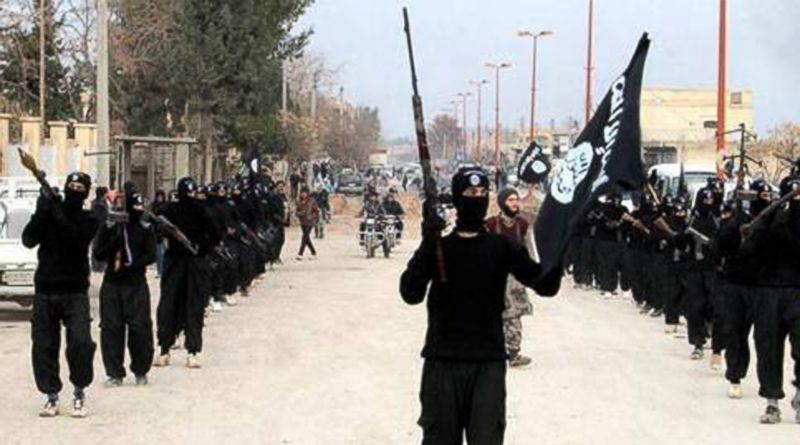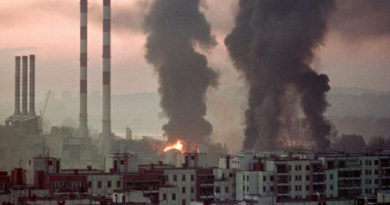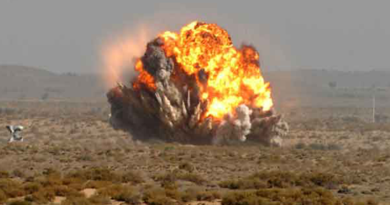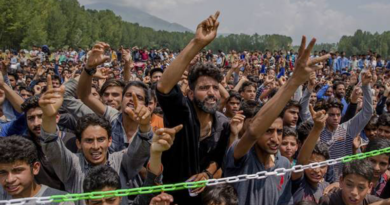Religious Extremism is the biggest internal threat to Islamic Movement
Extremism has become a part of the modern day political vocabulary, but most often the word is used, rather misused for political purposes. It is because of this gross misuse of the word that the underlying concept is either totally misunderstood or least understood. Actually one would tend to disregard the need to understand the underlying concept, simply because there is nothing the word really stands for; it is simply the political motive of the user that determines the meaning of the word. For example, India would call anyone who calls it an occupier, or does something to force it out of Kashmir, an extremist, although there is no extremism involved here. As such, one might perhaps conclude that extremism is simply a label of convenience, and does not stand for anything definite in the real world. This, however, will be a hasty and erroneous conclusion. True, extremism is a label of convenience but it is not just that, there is a reality to which this word refers to, and we need to understand that, and wake up to the dangers it poses, if we, as all of us should, are committed to the Cause of Islam which at the end of the day is the Cause of humanity at large.
Understanding Extremism
To understand the real object that extremism genuinely refers to, we have to look at its concrete and contemporary manifestations, and nowhere is it manifested in more clear form than the current situation in Pakistan. This situation as it has developed in the last thirty years, primarily during and after the Afghan resistance against the Soviet occupation in 1980s during late General Zia-ul-Haq’s rule is, per se, not our subject of analysis here, our focus now is extremism, or to be precise, religious extremism, and the situation in Pakistan helps us to identify this menace, and provides a real context in which one can, and should, understand all that we will be talking regarding religious extremism in the subsequent lines.
Pakistan is fully engulfed by the menace of religious extremism, and it has the potential to threaten its existence. Innocent people are killed in mosques, Imambarahs, Shrines, and other public places. Some say all these acts of violence are engineered either by Pakistan’s intelligence agencies themselves, or there is a foreign (read: Indian) hand behind these unfortunate happenings. Whatever the case, the relevant point here is that there exists a mindset locally, i.e. inside Pakistan itself which is the original source of all this death and destruction, and it is this mindset that the external/internal hand too relies on. It is because of the existence, and increasing power and influence of this mindset that intolerance is fast spreading in Pakistan. Learned scholars and ulema with a dissenting opinion in such matters such as suicide bombing are silenced to death, or forced to flee the country. True, penalty for blasphemy is not debatable, but how to make laws that could penalize the real culprit and not victimize an innocent person could be a matter of debate, and people can hold different views, which definitely is not a crime except in Pakistan where people risk their lives by expressing their view on this. Irrespective of whether we are facing it firsthand or not, we need to be on guard against this mindset of religious extremism. Its main characteristics are that it is hate-driven, claims monopoly over the truth regarding everything outside its fold as ignorance or heresy, has absolute lack of tolerance, regards violence as the only tool for problem-solving, and has a complete disdain for the rule of law. Because of these traits this mindset is anti-civilization, and hence an impediment to the forward march of Islam in human history, which means it is in conflict with the historical purpose of Islam. Islam at every stage in human history offers a viable civilizational solution to people providing them an overarching framework of Islamic beliefs, values, laws within which all their socio-cultural progress and intellectual achievements get properly and meaningfully accommodated, and they live a descent life, both, individual and social, which produces a better life for them in the hereafter. As mentioned earlier, one should have no doubt that the Cause of Islam is ultimately the Cause of humanity. Humanity cannot reach its zenith, and realize its potential, it will fall miserable prey to the deceptive allurements and charms of this world, if human beings live in this world heedless of Divine Guidance and accountability before God. Unless this worldly life paves the way for a person to successfully move on, and graduate to a better, advanced, and dignified life in the hereafter, what is the end result of living a life of 40, 60 or 90 odd years? Absolutely nothing. Whether one lives a very difficult life, struggling all along to make both ends meet, or one has everything in abundance, the end result is the same: the life of this world has ended in naught, without producing anything useful for the following stage, although at different stages of life, as we see, the preceding stage usually produces something useful for the next. The civilizational solution that Islam provides is precisely meant to rescue people from this huge loss. The Western Civilization looking at the whole world in terms of money, market and profit, aims to defeat this Islamic solution confronting it from outside, religious extremism aims to subvert it from within. We need to be very cautious about this for mainly two reasons, one, it is a huge internal threat to Islamic Movement, the other, it has a direct bearing on the future of Kashmir.
a) Internal Threat to Islamic Movement
Islamic Movement represents the dynamic reality of Islam. For the purpose of understanding, one can differentiate between the static and the dynamic reality of Islam which in fact are not two different realities; there is one single Divine Truth, Islam, that underlies both, but whereas the static reality refers to body of beliefs, concepts, values, and ethics, as laid down in the books, and transmitted from one generation to another in academic institutions and Madrasahs, the dynamic reality refers to the historical expression of this Truth at various points in time. Manifesting itself in the form of a historical movement, Islam’s dynamic reality like any other historical movement, assumes an identity on the basis of which people living in that particular era make up their minds as regards the question ‘what does it stand for?’ which in turn is determined by the platform(s) the movement is operating from. The platforms or planks are basically the integral elements in the ideology of Islam, and when it comes to the dynamic reality, these elements constantly undergo a process of rearrangement and resetting in response to the changing historical conditions and human situation. As such, the Islamic Movement gets identified with a particular platform that it has chosen to operate from in a particular historical era. Let me elucidate:
It has been clearly said in the noble Quran that all prophets regardless of time and space were sent with one basic Message, namely that of Monotheism, the ‘Tauhid’: “And We did not send before you any messenger but We revealed to him that there is no god but Me, therefore serve Me” (21:25). But at the same time we also see that the Prophetic Movements as narrated in Quran had a clear historical identity because within the dynamic reality of Islam represented by a particular Prophetic movement, one element got precedence over the other depending on the historical context. Hence in Prophet Shuaib’s(AS) movement the element of justice relating to weights and measures had taken priority and become the main platform, and so had the issues of homosexuality in Prophet Lut’s(AS), and liberation of Bani-Isreal from Pharaoh’s rule in Prophet Musa’s(AS) movements. As the wheels of a locomotive enable it to move, the platforms on which the Islamic Movement stands, not only give it an identity, but enable its progress across time-space as well, or to put it other way, the Movement succeeds in changing the human situation for the better, and positively influencing the course of history. Among other reasons, this was an important reason why the Islamic Movement triumphed in Iran: it operated from the right platform. Not only did it succeed, it disarmed the fake claimants to that genuine platform. One may recall that Imam Khomeini made the uplift of ‘Mustadh’afeen’, a Quranic term for the downtrodden and the oppressed, as one of the main planks of Islamic Revolution, and it has now been widely accepted in informed circles that this single factor, namely, Imam’s emphasis on the uplift of downtrodden, was what caused the death of Communism and the Communist movement. One may ask how, because apparently the Islamic Revolution was directed against USA and its control over Iran, the then Soviet Union (the Communist state) was not directly in the firing line. But it is here, that is, in answering this question that the crux of our argument lies. The Communist movement had grabbed a platform for itself where it was inherently unable to deliver, but at the same time it was a very valid, universally acceptable, and one of the priority platforms in our day and age. This was the platform of the rights, empowerment and uplift of the world’s poor and the downtrodden, labourers and the workers. Imam Khomeini by making it one of the main planks of revolution reclaimed this platform for the Islamic Movement, the place where it rightfully should have been in the first place. In doing so, he pulled the rug from under the feet of Communist Movement. He did not create a class war, his vision and method was not hate-driven as was that of Communism, he out of his profound love for Allah(SWT) could not see the miserable plight of the week and downtrodden, whom he regarded, in light of a Prophetic hadith, as the vulnerable members of the God’s family. Not all who were drawn to Communism, had accepted its essence, the atheistic materialism, they had gathered around the pro-poor platform it had sought to monopolize. So the question of what does the Islamic Movement stand for, and is perceived to be standing for is absolutely crucial. When we say religious extremism subverts the Islamic Movement from within, we are referring precisely to that crucial question. It distorts the identity of the movement by replacing the planks on which it stands and could move on. Islam in this day and age should be identified with values and virtues like justice, knowledge, freedom (within the servitude of Allah), compassion, logic, argument, dialogue, tolerance, and rule of law. These are the civilizational hallmarks, and really the favourites of our age, and above all, the integral constituents of what the Last Prophet, the most Blessed of Allah’s Creation has brought to humanity. The Islamic Movement gets subverted when all these planks are surrendered to those who not only have to do nothing with Islam; they have no real commitment to those planks as well. Again, if one looks at the situation in Pakistan this is what has happened there. Islam is identified with lack of tolerance, with wrath and anger instead of compassion, with violence instead of argument and dialogue, with anarchy instead of rule of law. People do not flee from Islam as such, they flee from the subverted image religious extremism has given to it, and this is, and must be of concern to us all.
b) Bearing on the Future of Kashmir
What has been going on in Kashmir ever since its occupation by India in 1947, and more so for the past 21 years must culminate into a better future for Kashmir. That future starts with the total end of Indian occupation, but does not stop there. We need to become a healthy, progressive and an internally strong society. Internal strength is not a function of military power, it is a function of balance and moderation, as opposed to extremism, in the collective thought and conduct of people, and among other things, it will derive from our capability to keep communicating with each other, allow, appreciate and sincerely tolerate the difference of viewpoints, resolve differences through dialogue, etc. etc. It is only in such societies that the doors of unfriendly interferences are effectively closed, because others come to interfere when you are unable to solve your problems by yourself.
***
Dr. Syed M Inayatullah Andrabi is a well-known figure in the circles of political Islam. Born in Srinagar, the capital city of Indian Held Kashmir, Dr Andrabi has been intimately involved at the intellectual level with the global politics and political issues since his student days in 1980 at Pune (India), where he completed his Ph.D. in Linguistics in 1983 at the Centre of Advanced Study in Linguistics, Deccan College, University of Pune, Pune, India. Upon completing his doctorate he returned home to join the University of Kashmir, first on a post-doctoral fellowship and later as faculty, but could not continue because of the deteriorating security situation in Kashmir, and had to move to United Kingdom in 1994 where he continues to live since along with his wife and five children.




